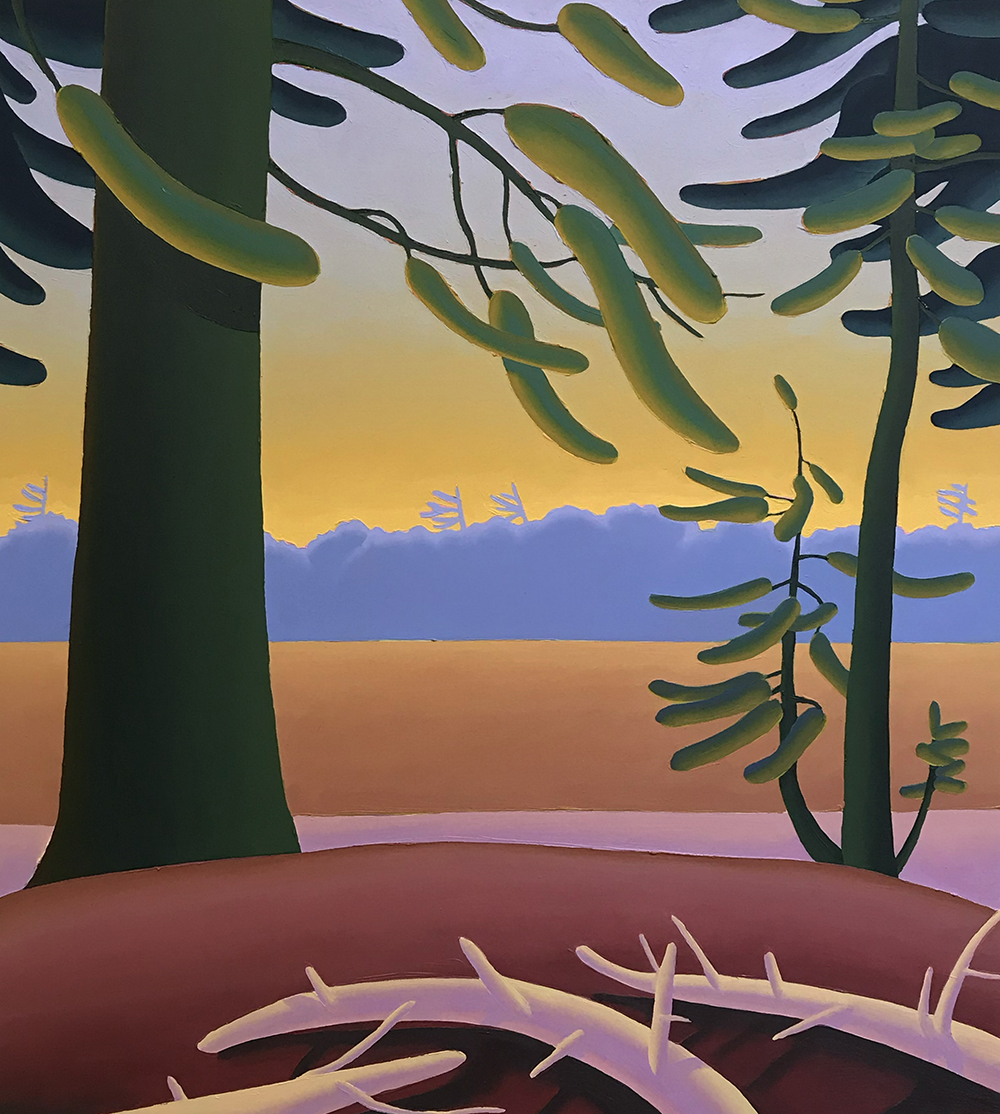Madeleine Bialke
Long Summer
December 2021
Huxley-Parlour Gallery
Huxley-Parlour are delighted to present Long Summer, a solo presentation of 14 new paintings by
New York based artist, Madeleine Bialke. It will be Bialke’s first UK solo exhibition, and her most
personal exhibition to date.
The paintings in Long Summer take imaginative departure from Bialke’s time at her family’s cabin
in the Adirondacks during the first summer of the pandemic. Recovering from Lyme Disease, and
drawing on the “dark underbelly of 1950’s nostalgia” from the locally inspired movie, ‘A Place in
the Sun’, Bialke renders these familial woodscapes in sickly, sallow, apocalyptic hues. In several
paintings, (Three Sisters, Two Augusts in a Row, and Cliffhanger) cold blue ‘figures’ seem to reject
any external visual warmth, as if they have contracted a mysterious disease.
Bialke’s paintings are largely unpeopled, choosing instead to centre organic forms: ‘lozenge-like’
leaves, fulsome, rounded bushes, and insidiously anthropomorphic foliage. Here, Bialke subverts
an anthropocentric perspective, undermining the mainstream assumption that the natural world
be seen primarily as a resource for humans. This can be sensed in Bialke’s eerie compositions,
which not only shore stillness and movement against one another, but in which people and trees
uncannily mirror one another’s postures in a tender gesture of mutual recognition. Here, sickness
is a pervasive and totalising theme.
Bialke’s work relates to the flat, empty planes of artists such as Edward Hopper and Grant Wood,
and in particular the work of the Group of Seven - a group of Canadian landscape painters
working at the turn of the century. Whilst all of these artists probed the relationship between
society and the environment at the waning of the industrial age, Bialke’s work brings these ideas
into a contemporary context by reading syntheticism and toxicity into organic forms. Here, Bialke
creates an art that comments on the anthropocene. Underlying serene, empty planes, Long
Summer poses quietly alarming questions about climate, industry, and our collective fate.
In situ
![]()
Verdict, 2021. Madeleine Bialke
Huxley-Parlour are delighted to present Long Summer, a solo presentation of 14 new paintings by New York based artist, Madeleine Bialke. It will be Bialke’s first UK solo exhibition, and her most personal exhibition to date.
The paintings in Long Summer take imaginative departure from Bialke’s time at her family’s cabin in the Adirondacks during the first summer of the pandemic. Recovering from Lyme Disease, and drawing on the “dark underbelly of 1950’s nostalgia” from the locally inspired movie, ‘A Place in the Sun’, Bialke renders these familial woodscapes in sickly, sallow, apocalyptic hues. In several paintings, (Three Sisters, Two Augusts in a Row, and Cliffhanger) cold blue ‘figures’ seem to reject any external visual warmth, as if they have contracted a mysterious disease.
Bialke’s paintings are largely unpeopled, choosing instead to centre organic forms: ‘lozenge-like’ leaves, fulsome, rounded bushes, and insidiously anthropomorphic foliage. Here, Bialke subverts an anthropocentric perspective, undermining the mainstream assumption that the natural world be seen primarily as a resource for humans. This can be sensed in Bialke’s eerie compositions, which not only shore stillness and movement against one another, but in which people and trees uncannily mirror one another’s postures in a tender gesture of mutual recognition. Here, sickness is a pervasive and totalising theme.
Bialke’s work relates to the flat, empty planes of artists such as Edward Hopper and Grant Wood, and in particular the work of the Group of Seven - a group of Canadian landscape painters working at the turn of the century. Whilst all of these artists probed the relationship between society and the environment at the waning of the industrial age, Bialke’s work brings these ideas into a contemporary context by reading syntheticism and toxicity into organic forms. Here, Bialke creates an art that comments on the anthropocene. Underlying serene, empty planes, Long Summer poses quietly alarming questions about climate, industry, and our collective fate.
In situ

Verdict, 2021. Madeleine Bialke